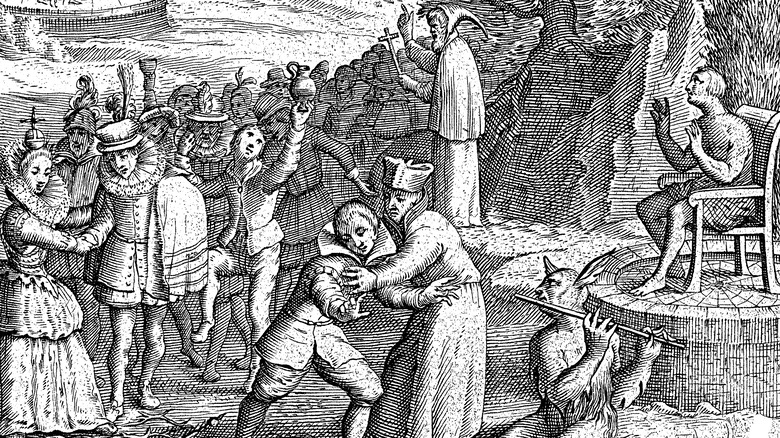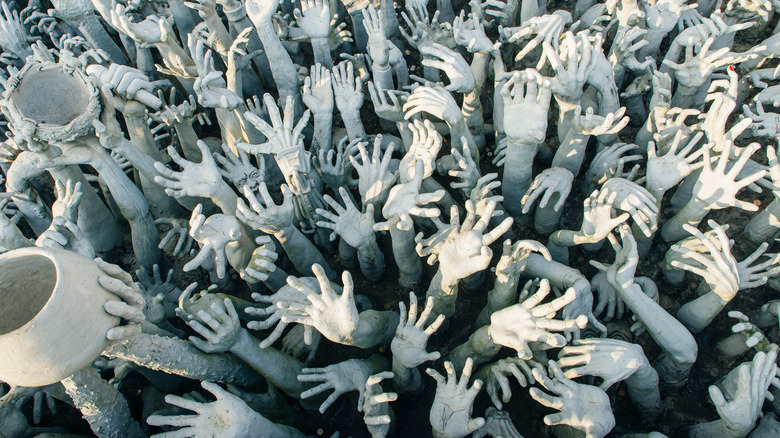The Real Reason Many Churches Deny The Existence Of Purgatory
Christianity, as a whole, does not have a singular, unified doctrine about what takes place after the believer dies, or when those events take place, as Christianity notes. Rather, faithful across the world have different beliefs about when the dead will be judged — for example, immediately after their death, or after Christ returns? However, many Christians believe, as BBC News notes, that the dead will spend eternity in one of two places: heaven or hell (although it bears noting that whether these are real places, or are more metaphorical, or planes of existence, is also in dispute).
For Catholics, there's a third option: their doctrine holds that there's a sort of intermediary place, called purgatory, in which those whose sins are enough to keep them out of heaven are "cleansed" in a manner of speaking, until they're sufficiently purified and can pass through the pearly gates. Specifically, the doctrine states that sinners are cleansed by fire — not eternal, punitive fire, as in hell, but fire intended to purify the sinner. It's a doctrine that is almost universally rejected by non-Catholics, although, as The Los Angeles Times notes, it is starting to gain some acceptance among Protestants.
The origins of purgatory
Purgatory is not mentioned in the Bible, according to Christianity Today. However, the philosophical roots of the concept do appear in extra-canonical works, including passages wherein people recited prayers for the souls of the dead, such as in 2 Maccabees. Further, believers point to other verses, in the Old and New Testaments, that they say suggest an intermediary plane of existence where souls just exist — prior to being sent to heaven or hell — and there, they can be prayed for, just as the living are, or could even be cleansed of their sins.
By the 4th and 5th centuries, according to New Advent, Catholic philosopher Augustine of Hippo had settled on the existence of purgatory. In the mid-14th century, the Catholic Church officially added the doctrine of Purgatory to its dogma, via the Council of Florence, as Catholic Essentials notes. Meanwhile, though textual sources are thin on what purgatory looks like or what supposedly goes on in there, the place got a poetic description via the 14th-century allegory, Dante's "Divine Comedy," as The New Yorker notes.
Why (most) Protestants reject purgatory
Notably, the concept of purgatory, at least in its fully-fleshed-out form, is not mentioned in the Bible at all. Rick Phillips goes so far as to write for Tenth Presbyterian Church that the verses that Catholics believe suggest the possibility of purgatory are being misinterpreted. Beyond what he sees as the lack of support for purgatory via the canonical Bible, Phillips writes that the entire concept flies in the face of the foundation of Protestantism. "[Purgatory] denies the biblical doctrine of justification by faith alone, so central to our faith. According to the Bible, we are saved from our sins by trusting in Jesus Christ as our Savior ... Our sins are taken away by Christ's death on the cross," he writes.
However, writing in Premiere Christianity, Toby Lane notes that the concepts of purgatory and justification by faith alone aren't necessarily mutually exclusive and that Protestant Christians would do well to at least consider the possibility. "If you died and went to heaven today, would you be ready to stand in front of a perfect God? Certainly, our sins are forgiven, and we stand righteous in his sight, but the shaping of our character may be a longer process," he writes.


